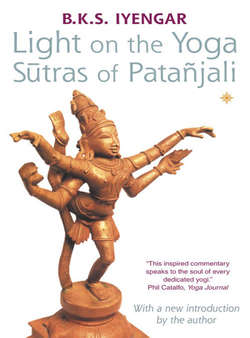Читать книгу Light on the Yoga Sutras of Patanjali - Литагент HarperCollins USD - Страница 35
Niyama
ОглавлениеThe five niyamas are to be followed not merely as individual, but also as spiritual, disciplines. They are: sauca (cleanliness or purity), santosa (contentment), tapas (religious fervour), svadhyaya (study of the sacred scriptures and of one’s own self) and Isvara pranidhana (surrender of the self to God).
sauca is of two types, external and internal. One’s daily bath is external; Asana and pranayama cleanse one internally. They help to cleanse one’s thoughts, words and actions, and make the body fit for its Lord to dwell in. Santosa brings about a state of cheerfulness and benevolence. Tapas is a burning effort involving purification, self-discipline and austere practice. It is religiousness or devoutness in the practice of yoga. Tapas purges and purifies the body, senses and mind. Svadhyaya enlightens the practitioner with the knowledge of his inner immortal being. Isvara pranidhana brings the inner being to his creator, the Supreme God.
Actually, the observance of yama brings about niyama, and the practice of niyama disciplines one to follow the principles of yama. For example, non-violence brings purity of thought and deed, truthfulness leads to contentment, non-covetousness leads to tapas. Chastity leads to the study of the self, and non-possessiveness to surrender to God. Similarly, cleanliness leads towards non-violence, and contentment towards truthfulness. Tapas guides one not to misappropriate another’s wealth. Study of the self leads towards chastity, and surrender to God frees one from possessiveness.
By now, the reader is acquainted with the causes of afflictions. Not only do yama and niyama help to minimize and uproot them; they are also the firm foundation of spiritual experience. They are the ethical disciplines which show us what must be done and what must be discarded. They are the golden keys to unlock the spiritual gates.
Sooner or later, improper use of words, impure thoughts and wrong actions result in pain. Pain may be self-inflicted (adhyatmika), due to fate or heredity (adhidaivika), or to imbalance of elements in the body (adhibhautika). It may be caused by lust, anger or greed, indulged in directly, by provocation or by compliancy. The resulting sorrows may be mild, moderate or intense.
The causes of lust, anger and greed can be countered directly by self-analysis, or subdued by invoking their opposites: balance, poise, peace and harmony. Because the latter dualistic approach may cause one to hide from the facts, the former is the better approach. The use of analysis, study and investigation requires courage, strength and discretion. The evocation of opposite tendencies is not a cure, but a help. The first is a direct method of purification; the second an indirect method of appeasement. Patañjali suggests that both should be followed to speed progress.
